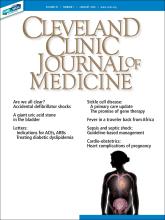We would like to thank Dr. Fakheri and colleagues for their extremely helpful comments on our recent review of angiotensin-converting enzyme (ACE) inhibitors and angiotensin II receptor blockers (ARBs).1
We agree entirely with their suggestion on the lack of current data on any superiority of ACE inhibitors or ARBs in patients with diabetes without proteinuria and diabetes with “normal” renal function.2,3 As mentioned, the sentence perhaps lacks clarity.
In the United Kingdom, ACE inhibitors and ARBs are commonly prescribed for diabetic microalbuminuria, proteinuric renal disease, and hypertension, as well as after myocardial infarction and in heart failure.4 We therefore also concur that heart failure with reduced ejection fraction could be added to the list of conditions that are indications for inhibition of the renin-angiotensin-aldosterone system irrespective of the initial blood pressure level.
Interestingly, chronic kidney disease is associated with significantly increased risk of cardiovascular disease and cardiovascular death.5,6 Studies of patients with chronic kidney disease have noted an increased relative risk of coronary heart disease, heart failure, and stroke compared with those without chronic kidney disease.7,8 We recognize that additional randomized controlled studies and a better understanding of these differences in risk are required to guide optimal therapy and improve outcomes, and we wonder if ACE inhibitors and ARBs might be useful in this high-risk population even before proteinuria is established, as alluded in the heart failure group.
Finally, although the data are not available, we wonder if over a longer period of follow-up, one may in the future see a benefit from reduced intraglomerular hyperfiltration, but we concede this is mere speculation, and more recent data have challenged the hyperfiltration model of renal damage.
- Copyright © 2020 The Cleveland Clinic Foundation. All Rights Reserved.






